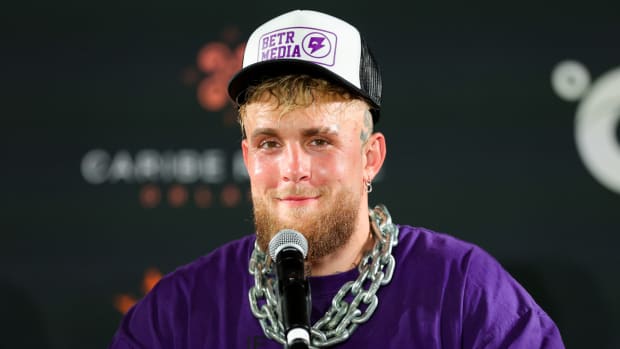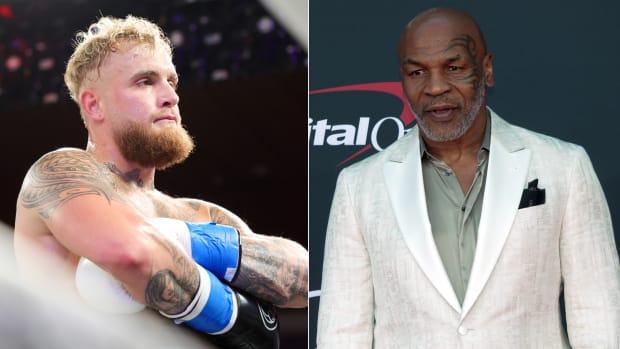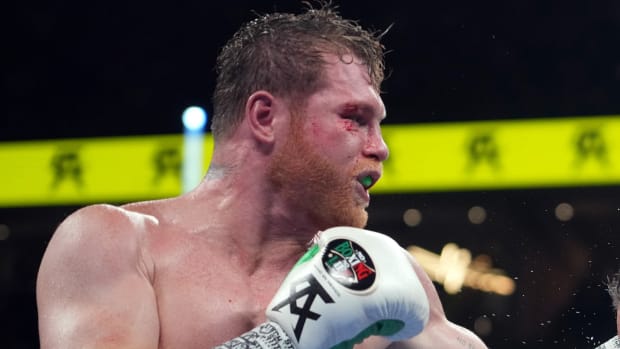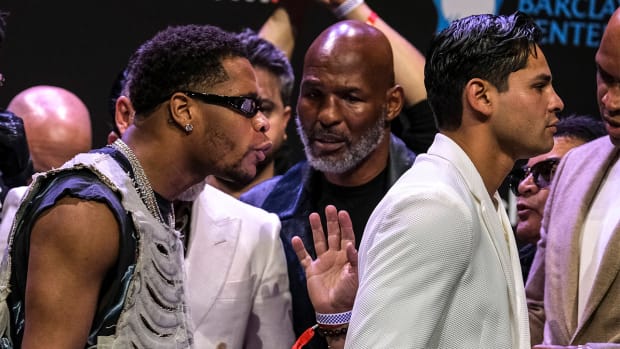You Can't Keep Tyson Fury Down—Unless You’re Tyson Fury
Tyson Fury’s voice booms through the phone. It’s late Tuesday, and Fury—days away from facing undefeated prospect Otto Wallin—has been through the media ringer. An open workout. A string of interviews with U.S. and foreign press. Ten minutes, PR flack advises a reporter. The energy in Fury’s voice suggests he could talk for hours.
Fury is the best thing going in boxing. Want an opinion on Anthony Joshua? “Can’t change a bull into a race horse,” Fury said of the now former heavyweight champion this week. Fury actually likes Joshua. He’s been known to call him … to tell him he plans to knock AJ out. It’s not just Joshua that Fury calls, either: Dillian Whyte, a rising heavyweight, and MLS star Wayne Rooney get the same treatment.
Looking to do a deep dive on his past? In interviews, Fury holds little back. He was born premature, just one pound, eventually sprouting to a 6’9”, 250-pound Goliath. He grew up a traveller, a gypsy, a group routinely ridiculed for its lifestyle. He won the heavyweight championship in 2015, ending Wladimir Klitschko’s decade-long reign, and promptly fell into a deep depression. He thought about suicide. He nearly attempted it. He woke up every day wishing he didn’t. His wife, Paris, often wondered if she would get a phone call telling her he was dead.
Fury is a survivor. And now he is back on top. He is 3-0-1 since ending a 2 1/2 year layoff last summer, the draw an electrifying battle with Deontay Wilder, a fight that saw Fury absorb a heavy head shot from boxing’s heaviest hitter in the 12th round, hit the deck, and climb back up from it. On Saturday he will fight for the second time in Las Vegas, against Wallin, who Fury will make millions of dollars to pummel on ESPN-Plus.
Life is good for Tyson Fury. For now.
That’s the thing with Fury: You never know when this ride is going to end. Will it end in the ring? Fury hasn’t always been considered among the heavyweight elite. For years he was something of an anomaly. He was the fighter who punched himself in the face. The one who got decked by Steve Cunningham, a blown up cruiserweight. Even after he topped Klitschko, the narrative was more about what Klitschko didn’t do than what Fury did.
Will it end against Wallin? It’s unlikely. Fury has been as listed as high as a 25-1 favorite against Wallin, an undefeated but untested opponent. Wallin has dreams of following in the footsteps of Ingemar Johansson, his compatriot who upset Floyd Patterson on U.S. soil to win the heavyweight title in 1959. Fury’s plan is to dispatch Wallin and move on to an anticipated rematch with Wilder next year.
Will it end outside the ring? Fury knows his demons will always chase him. Winning titles doesn’t defeat them. On a podcast with Mike Tyson, Fury described the low he felt after beating Klitschko. How when he got back into the dressing room and wondered what his purpose would become. How he thought he was finished. Tyson, once obsessed with being heavyweight champion, looked at Fury, bewildered.
Many in boxing wondered if, after the draw with Wilder, Fury would slip back into his old ways. If he would let his conditioning go—he ballooned to nearly 400 pounds during his long layoff—and never return. Instead, Fury stayed in the gym. He punted on an immediate rematch with Wilder, choosing instead to sign a co-promotional deal with Top Rank that reportedly could be worth as much as $100 million. He knocked out an overmatched Tom Schwarz last June and is back in the ring three months later. Bob Arum—who knows something about heavyweights—believes Fury could eventually become one of the best big men ever.
The secret, Fury says: He’s happy.
“I’m more happy now than I have ever been in my career,” Fury told SI.com. “I’ve learned to live and let live. I’ve learned to forgive and forget. I got to this point by just being real with myself. If I could forgive everyone for everything, then you can really let go of any bad feelings. And that’s it.”
“I’ve had a lifestyle change. I’m living life as an athlete, which I should have done years ago. But better late than never.”
Boxing fans should root for Wilder. Not to win, necessarily. But to stick around. Boxing is experiencing a heavyweight resurgence. Wilder’s profile is growing. Fury sits atop a strong group of European heavyweights that includes Joshua, who will attempt to regain his titles in a rematch with Andy Ruiz in December, Whyte and Dereck Chisora. Joseph Parker is around. Daniel Dubois is a young British heavyweight on the rise. At 31, Fury could be in line to face all of them.
And that’s a good thing. Fury is a promoter's dream. He’s a viral video waiting to happen. He talks the talk, and when he steps in the ring he is willing to walk the walk. He intends to be around for a while. At the end of an interview, Fury reiterates: It’s because he is happy.
“A happy fighter is a dangerous fighter,” Fury said. “I run down the road 20 miles, do a hundred rounds on the mitts, none of it is important if you are not a happy fighter. It’s not a fitness contest or a weight lifting contest. It’s boxing, and you have to be happy to do it. And I’m happy with where I am and who I am in my life.”




